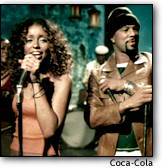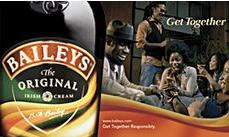Are Neo Soul Listeners "Elitists?"
By Sean
Editor-in-Chief, Neo Soul Today
 Sometimes when I look in the mirror, I ask myself if I'm a "music snob." I mean, really. Do I think I'm superior to others because I love music that a majority of the world's population doesn't even know exists; and am serious about it? Do I think I'm better than even those who listen to neo soul (or whatever you choose to call it), but are less serious about it?
Sometimes when I look in the mirror, I ask myself if I'm a "music snob." I mean, really. Do I think I'm superior to others because I love music that a majority of the world's population doesn't even know exists; and am serious about it? Do I think I'm better than even those who listen to neo soul (or whatever you choose to call it), but are less serious about it?There was a very good October 17, 2003 Boston Globe article by Renee Graham entitled "Neo Soul Movement Stirs Soul Feud." Graham's article discussed how neo soul artists -- for all of their original promise -- had not continued to make a major impact. It postulated that, at the end of 2003, the "neo soul movement" had retreated to the underground and was trying to regain mainstream attention with artists such as Anthony Hamilton. Also, the article went into how artists, such as Hamilton and Lizz Fields, were (and still are) ambivalent toward the term "neo soul" -- virtually a requirement for any literary work on the subject. It reviewed how neo soul was all but on its way to the mainstream and was more than just a paradigm shift in music. Rather, it was a "movement and a mind-set;" out of which even a movie, "Love Jones" (1997), was born targeted toward this so-called "neo soul mind-set" market and thereby perpetuating the movement. Unsurprisingly, Ms. Graham goes on to propose that neo soul's initial failing was "the media-created label itself -- a term that the artists, whom it was meant to represent, generally rejected." Well, if you're a regular Neo Soul Today reader, this irony central to the music is not news to you. So what, then, makes this article so interesting? Consider, if you will, the following excerpt from Ms. Graham's article:
"Reveling in a music-first ethic, the neo-soul movement could seem a little sanctimonious. It was soul music for smart people, with a tangible elitism and self-importance that some may have found off-putting."
Wow. Is she right? Keep reading.
Late last year, I came across a blog named "The Soul Movement" with a well-written post entitled "Soul Music: A Serious Contender to Hip-Hop's Economic Throne?" by freelance writer and underground soul artist publicist Gabriel Rich. The post cites some astounding statistics about the so-called the "neo soul mindset" market from studies conducted by market research think tanks TMG and Edison Media Research. Ponder this from Rich's post:
It is estimated that "the (Neo) Soul mindset market represents 50 million consumers with a mind-boggling $65 million in buying power"
"The median age of the (Neo) Soul consumer is 32.2"
"60% of females list (Neo) Soul as their favorite music compared to 39% of males"
"African-Americans comprise over 60% of the Soul music’s listeners. Whites make up around 20%."
"The average income of the (Neo) Soul listener is $85,000"
"4 out of 5 (Neo) Soul listeners have college experience or hold college degrees"
Very interesting. I've been in touch with Gabriel and he confirmed that these numbers are authentic and accurate and that his sources are credible. Based on these statistics, he concludes that "Soul is the music of the mature adult." I've always held that sentiment and these numbers simply quantify it. However, do these numbers also support Ms. Graham's claim that the neo soul movement is "sanctimonious," "for smart people" with a "tangible elitism" and sense of "self-importance?" Well, I can confidently infer that "the majority" of serious neo soul listeners are educated, established, affluent, predominantly black, and predominantly female.
Apparently, I'm not the only one who feels this way.
 Many marketing departments in corporate America appear convinced as well. You may have noticed this yourself when watching TV, reading a black magazine, or observing billboards in urban areas. For instance, in 2003, Coke launched its "Real" advertising campaign as part of a broader marketing strategy to reinvigorate the brand by increasing its share of the young adult market. This campaign is most notable for its TV ads featuring everyday people in everyday situations. The third TV ad to launch in the campaign featured Mya and Common performing a duet about staying "real and true to one's self." Subsequent spots featured both mainstream and undergroud artists including Angie Stone, Musiq, The
Many marketing departments in corporate America appear convinced as well. You may have noticed this yourself when watching TV, reading a black magazine, or observing billboards in urban areas. For instance, in 2003, Coke launched its "Real" advertising campaign as part of a broader marketing strategy to reinvigorate the brand by increasing its share of the young adult market. This campaign is most notable for its TV ads featuring everyday people in everyday situations. The third TV ad to launch in the campaign featured Mya and Common performing a duet about staying "real and true to one's self." Subsequent spots featured both mainstream and undergroud artists including Angie Stone, Musiq, The  Roots' Scratch and ?uestlove, Amel Larreiux, Aaries, and Donnie. A 2003 EURweb article quoted Hussein Warmack, Coke Classic brand manager, as saying "We’ve chosen to go with artists from the neo classic soul music genre" because "neo soul is about being true to yourself. Being real. They write their own lyrics, sing their own music, dress how they want to dress." Baileys' "Get Together" marketing campaign offers print and billboard ads featuring mature, late-20s to late-30s adults (more women than men) getting together and socializing while drinking Baileys Irish Cream. Baileys and Coke are only two examples of companies apparently targeting this $65 million "neo soul mindset" market of affluent, young, educated adults who know what they like and have an easily-identifiable trait in common -- a love for neo soul.
Roots' Scratch and ?uestlove, Amel Larreiux, Aaries, and Donnie. A 2003 EURweb article quoted Hussein Warmack, Coke Classic brand manager, as saying "We’ve chosen to go with artists from the neo classic soul music genre" because "neo soul is about being true to yourself. Being real. They write their own lyrics, sing their own music, dress how they want to dress." Baileys' "Get Together" marketing campaign offers print and billboard ads featuring mature, late-20s to late-30s adults (more women than men) getting together and socializing while drinking Baileys Irish Cream. Baileys and Coke are only two examples of companies apparently targeting this $65 million "neo soul mindset" market of affluent, young, educated adults who know what they like and have an easily-identifiable trait in common -- a love for neo soul.
So clearly, more evidence is surfacing suggesting that many (not all) serious neo soul listeners have a common mindset supported by similarities in economic status (affluent), race (majority black), gender (more women than men), age (late-20s to late-30s), and education (mostly college-educated). Coincidentially, I obviously love neo soul and I match in every characteristic except for one -- gender (I'm 100% male).
So, although I always try to avoid generalizations, I can understand Ms. Graham's claim that the so-called "neo soul movement" consists of "smart people" with a "music-first ethic." However, I'm still struggling to understand where the claim that a "tangible" sense of "elitism" exists amongst neo soul listeners.
Recently, when doing a Google search on the phrase "neo soul," I ran across a bulletin board thread at digital-djs.com entitled "What's Wrong With the Term Neo Soul???" In fact, this thread was how I discovered Ms. Graham's article. The thread, begun by Digital DJs' DJ Melodic, reprised the article and posed the question, "Are we witnessing the downfall of this soul movement??? What can we do to make this music more mainstream???" The thread began and peaked over a time period from June 2003 to October 2003 and consists of interesting intellectual analyses (some overly analytical, some tangential) of Ms. Graham's article. However, the first person (codenamed "SaSkWatch") to reply was also intrigued by the paragraph containing the "elitist" reference, in particular. I highly recommend reading DJ Melodic's thread in its entirety.
In a nutshell, the most intriguing and honest replies appear to come from serious neo soul listeners who candidly admit that their rare musical tastes bear on the side of elitism and "musical bigotry." While these particular posters' candidness about their elitist tendencies is admirable, they also appear to struggle internally with it. They appear to struggle with the fact that their exclusive tastes may, just may, be one of the reasons why the neo soul artists they dote over struggle (no pun intended) to manufacture but one album, struggle to break into the mainstream, struggle to fill the house for a single concert, or, frankly, struggle to make a decent living. Below are some quotes from the thread relevant to the "elitism" claim that I found to be the most telling:
"I personally think that two of Soul Artist's greatest enemies have been the artists and the fans themselves...I have to look at my own self in the mirror and admit I too presented an elitist attitude regarding music. I have been called everything including being a 'musical bigot'. I would go on these self-important rants about why...Jill Scott is better than Ashanti, etc. This self-importance is pertinent to who, the 10 people that bought the Bilal LP? It sure is not important to the million plus that buys Nelly records. We complain about why [our artists] don't reach mainstream success, but its not like we endear ourselves to the mass market. The Roots and Jaguar Wright [make] a Coke commercial and you scream bloody murder. Common stands next to Mya, and you are like WTF? If we don't re-evaluate our thinking then we might be witnessing the end of a great musical renassiance. How can our artists afford to live, raise families, etc., when they can only get small venue shows, and the chosen few are buying their CDs?"
--SaSkWatch"The common consensus is that in some way we have all been deemed elitists and bigots because of our very stringent opinions. I consider myself an intellectual, and I will admit that I like that I'm into music that [a] majority may not like or know about. It kind [of] confirms my belief that [my]mindset is different (like my third eye is wide open...). But at the same time, I love the artists and their musical innovation -- and I want them to succeed and get the recognition they so rightfully deserve."
--SongByrd1"Some of these posts, prompt me to ask if folks like the music they claim to listen to or rather are they just trying to be different/fashionable/hip or whatever by claiming they like certain artists?"
--Jonathan"You have people who have dedicated their lives to music...They study it, live it, breathe it, perform it, and collect it like it was the sweet nectar of life. Conversely, I think you have people that look at music as a simple distraction...Ya know, its not that serious for them. Maybe its that commitment level that drives people to Soul, creates that elitist atmosphere or thought process, and lead people to sites like these. Let's face it, Soul Music is special music. I personally think that music has a higher purpose in a person's life. It can make people get "happy" in church. It gives you the goosebumps and/or gives you a feeling of euphoria. It can control your mood and your mindstate. Something that powerful should be looked at seriously and that wisdom needs to be shared...BUT... Just because we listen to special music, that doesn't make us special people."
--SaSkWatch
So what is my take on this proposal that serious neo soul listeners are essentially self-important elitists who think they are smarter than the masses? As of today, February 12, 2006, I identify the most with SaSkWatch's sentiments three years ago. I, too, am struggling with the underlying dichotomy of my passion for neo soul music and its artists. See, I still cannot go as far as to say I wish neo soul and its artists would go mainstream. It is the music's fundamental rareness, genuineness, and uniqueness that drives me to love it and the artists that make it. Yet, simultaneously, I'm pained by the fact that many of these artists have to struggle to live as a result of remaining independent and not going mainstream. Nestled within my DNA is an appreciation for going against the grain and being somewhat different than the masses when it comes to certain preferences (e.g., rare music such as neo soul). I truly believe, without any direct evidence, that many people who love neo soul also share this desire to be different. See, everyone has a set of preferences. Of those preferences, I'm sure there are one or two that you believe you know more about than most people in the world. In my case, neo soul just happens to be one of them. However, I do not think I'm superior or elite because I think I know more about neo soul than most?
Perhaps the "elistist" reference is more about the assumed economic and educational position of those with the "neo soul mindset" and less about the music.
Please comment with your thoughts. What do you think? After digesting the information in this post, do you think serious neo soul listeners (or those with the "neo soul mindset") are elitists?


